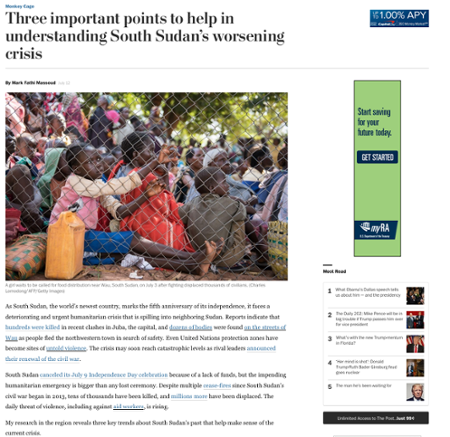In an op-ed in the Washington Post’s Monkey Cage blog on politics, politics professor and award-winning researcher Mark Fathi Massoud analyzes the ongoing political and humanitarian crisis in South Sudan.
Massoud, who has studied the region in depth, offers three critical points to help readers understand the problems and possible alleviations for the newly independent country. Examining lessons from past several decades for South Sudan’s current predicament, he argues that:
1) The country has a long history of migrants fleeing the country due to conflict.
2) Religious activism has shown to promote peace in the area.
3) International and local NGOs are helping to build the country’s democratic health and rule of law.
“Despite the torrents of hostility unleashed against them, the people of South Sudan share a legacy of struggle and survival. If the region’s history repeats itself, as it has in past iterations of war, the next cycle of violence and rebuilding will involve much needed humanitarian assistance to millions of war-displaced families, as religious and civic groups work to pick up the pieces,” Massoud writes.
Read the full piece on the Washington Post’s Monkey Cage blog on politics here.
Massoud is a member of the 2016 class of Andrew Carnegie Fellows and, in 2015, he received a Guggenheim fellowship. His first book, Law's Fragile State: Colonial, Authoritarian, and Humanitarian Legacies in Sudan (Cambridge University Press), received awards from the Law and Society Association and the American Political Science Association. You can find him on Twitter at @profmassoud and follow @UCSCSocSci for more news from the Politics Department, Legal Studies Program, and the Division of Social Sciences.

